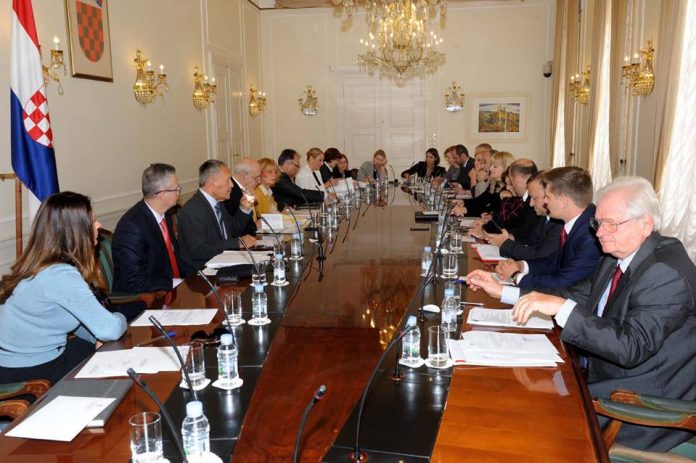75th Session of the Council for National Minorities was held in the Government of the Republic of Croatia on October 5th, Session marked by a discussion on the recently adopted Operational Programs for National Minorities 2017-2020.
Although some members of the Council for National Minorities of the Government of the Republic of Croatia prior to the Session stressed that it was pointless to discuss the Operational Programs for National Minorities 2017-2020 (given that it was about a document already adopted at the 53rd Session of the Government), this item of the agenda marked the 75th Session of the Council for National Minorities.
During the debate, operational programs were evaluated as a step forward and a basis for the preservation and exercise of the rights of national minorities, and as pointed out by the Chairman of the Deputy Club of National Minorities in the Croatian Parliament, MP Vladimir Bilek, “turbulent events attach particular significance to this document”. Bilek provided detailed reasons for this emphasizing that the adoption of this document “improves cohabitation of all citizens in our country” and that hopefully it might become a standard for all future Croatian governments.
However, criticisms of the Operational Programs could also be heard, especially by representatives of the Slovene, Bosniak, Macedonian and Montenegrin minorities who protested that they had learned of the drafting of documents too late and were dissatisfied with the fact that they did not have the opportunity to participate in the process of drafting them.
Representative of the Macedonian national minority compared the document with the “Two-Speed Europe” syntagm, according to which the minority without their own minority members in the Croatian Parliament exercise their rights in a “sluggish” first part of the document referring to all constitutionally recognized minorities, while others enjoy special rights and thus put into question the equal status of all minorities.
Although many arguments of dissatisfied members of the Council were accepted as justified and limited by the system, MP Ermina Lekaj-Prljaskaj emphasized that her door was open to all the national minorities she represented, while the President of the Council, Aleksandar Tolnauer was in favour of establishing “better communication” rather than options leading to additional misunderstandings among the members.

The newly elected representative of the Bosnian national minority, Bermin Meškić, pointed out that the Bosnian National Minority Council of the City of Zagreb, the Bosniak Culture Society “Preporod”, Bosniak National Community of the City of Zagreb, Bosniak National Council and the Bosniak Guard of Honour were also dissatisfied with the adopted document and expressed their dissatisfaction with a letter which was sent to him and to the Government of the Republic of Croatia. He noted that some of the above mentioned institutions and associations had presented their requests timely, but these requests had not been respected.
Representative of twelve national minorities, MP Veljko Kajtazi, emphasized good cooperation with all representatives of the national minorities he represented and the fact that he held a series of consultations and discussions prior to the drafting of the Operational Programs. Special Operational Program for the Roma National Minority he considered as a necessity with regard to “pressing issues of the Roma community” and commended the Government’s commitment with the special emphasis on the need for revision of the National Strategy for Roma Inclusion 2013-2020.
Conclusions of the adopted Operational Plans and their implementation will certainly continue to be the subject of discussion, both members of the Council and minority representatives in the Parliament, whose support to the Government is based on the commitment expressed by the fact that they have been drafted and that minority issues are an integral part of the Program drafted by the 14th Government of the Republic of Croatia.
It should not be forgotten that the adopted documents contain a provision imposing an obligation on the Office for Human Rights and the Rights of National Minorities to submit reports to the Government of the Republic of Croatia on the implementation of the Operational Programs, which is certainly a space for further talks and modifications that should in the future, at least partially reconcile the current imbalance.
The discussion continued in a more pleasant tone recapitulating the 15th anniversary of the Constitutional Act on the Rights of National Minorities, while the decision to mark this anniversary with a commemorative meeting organized by the National Minorities Council in cooperation with the Office for Human Rights and the Rights of National Minorities was unanimously adopted.
Members of the Council supported the initiative of the Minority SafePack Project, organized by the Federal Union of European Minorities (FUEN), about which we wrote HERE a few days ago.
Several transfers of funds to minority associations have been approved, which have been requested in accordance with the agreed rules.












